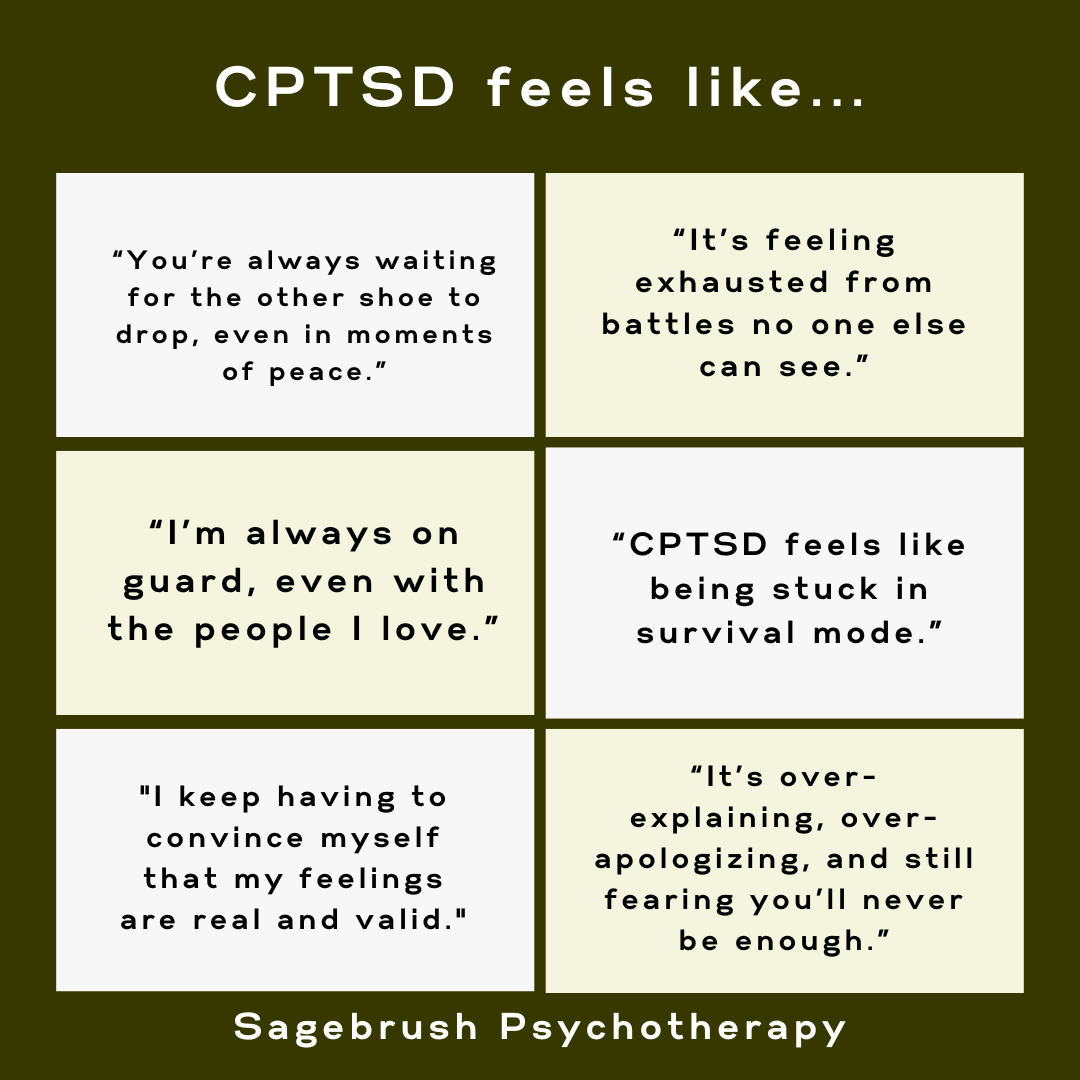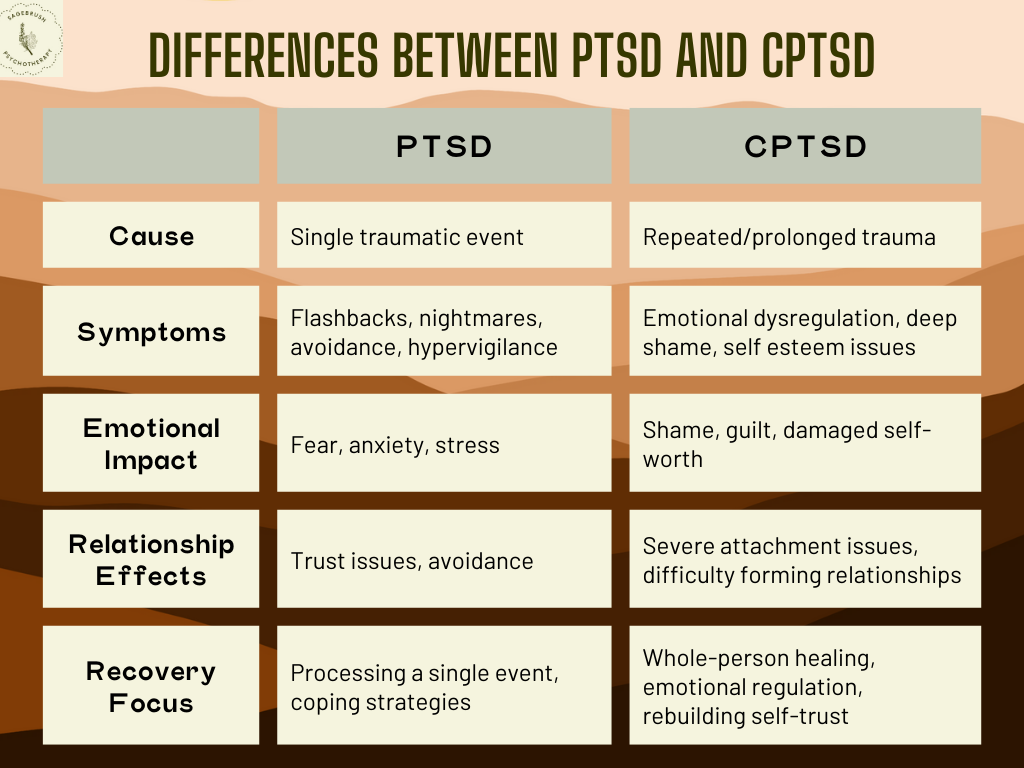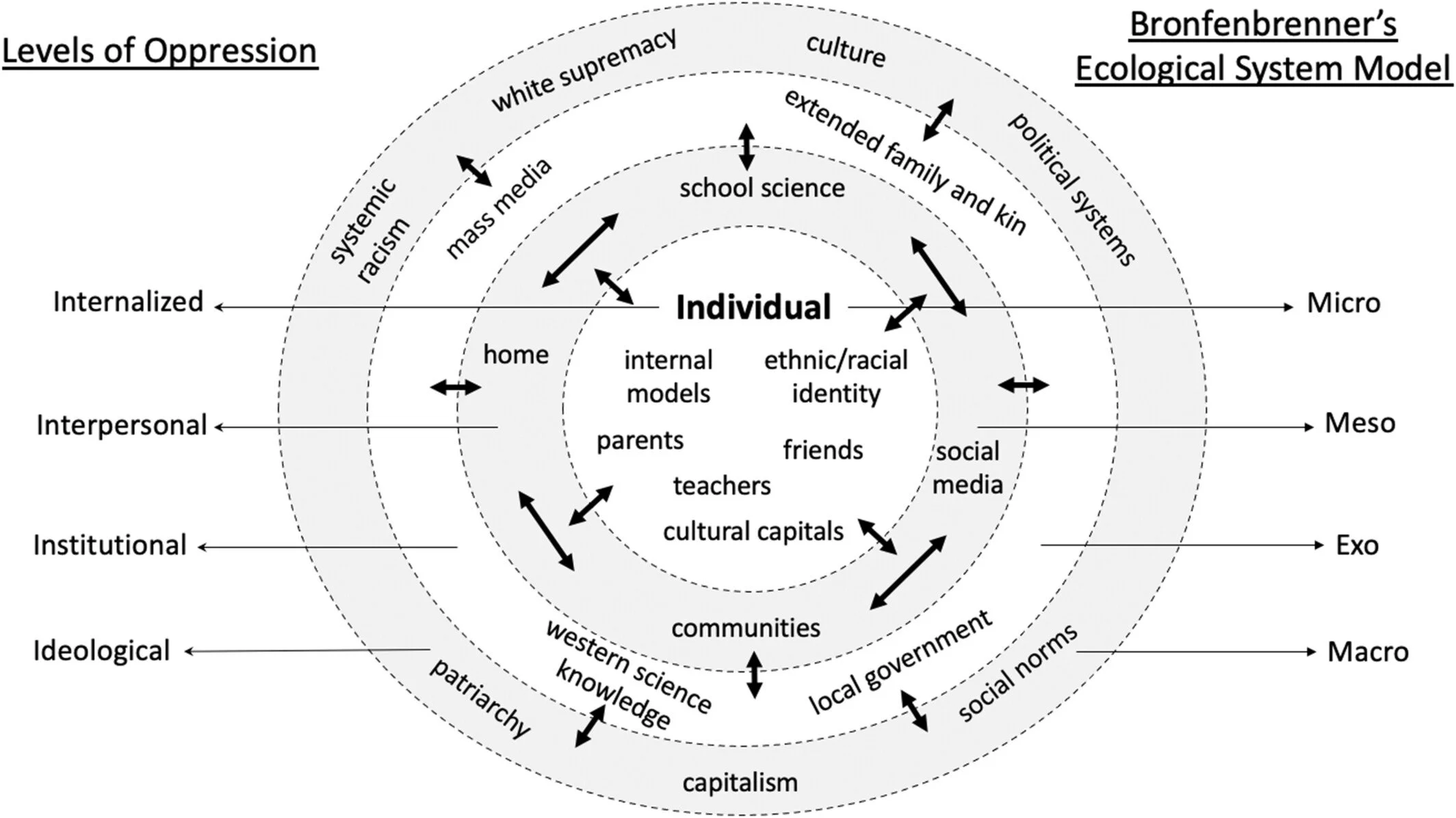Complex Trauma Therapy in Los Angeles
On this page:
Understanding Complex Trauma, Complex PTSD and Attachment, Understanding the Difference Between PTSD and CTPSD, Complex Trauma Recovery: Key Areas of Therapy, How DBT Helps with CPTSD, Schema Therapy for Complex PTSD, Systemic Oppression and Its Connection to CPTSD, Video Resource Describing CPTSD
Helping with Complex Trauma Recovery in Los Angeles
If the effects of complex trauma are holding you back from the life you deserve, we see you. Feeling stuck in cycles of emotional overwhelm, self-doubt, or relationship struggles can be exhausting—but you’re not alone. Whether you’re navigating childhood trauma, emotional flashbacks, or feelings of shame and disconnection, healing is possible. At Sagebrush Psychotherapy, we specialize in treatment to help individuals move forward from the lasting impacts of complex PTSD (CPTSD).
Why We Specialize in Complex Trauma Treatment
We deeply understand how trauma symptoms affect every part of your well-being—emotional, physical, and relational. Previous trauma, particularly when it occurs during your primary developmental years, can disrupt your overall well-being, leaving you feeling trapped in cycles of fear and shame. Our focus on complex trauma treatment is driven by the belief in your ability to heal and transform, even in the face of profound challenges.
This work is more than professional for us; it’s personal. Our team combines clinical expertise with a genuine understanding of the courage it takes to confront trauma. We’re here to walk with you as you reclaim your authentic self, establish boundaries, and reconnect with the life you deserve. Healing from CPTSD is not just possible—it’s a journey toward rediscovering your inner strength and resilience.
Understanding Complex Trauma
Complex trauma develops from chronic exposure to multiple traumatic events, often beginning in childhood and occurring within caregiving relationships. These experiences can disrupt emotional development, self-perception, and the ability to form secure relationships, leading to long-term psychological and physiological effects.
Intense emotional reactions or flashbacks related to past trauma
Difficulty regulating emotions or impulses, often leading to outbursts or dissociation
Persistent feelings of shame, guilt, or worthlessness
Chronic distrust, hypervigilance, or avoidance of relationships
Struggles with self-identity, self-worth, and a sense of purpose
Challenges in forming and maintaining healthy attachments, leading to fear of abandonment or difficulty trusting others
Complex PTSD (CPTSD) and Attachment
Attachment is the way we connect with others, especially in early relationships with caregivers. When a child experiences neglect, abuse, or unstable caregiving, they may struggle to trust others and feel safe in relationships later in life. Complex PTSD (C-PTSD) often comes from repeated trauma in close relationships, making it hard to build healthy connections.
How CPTSD Impacts Attachment
Fear of Abandonment: A deep fear of rejection, leading to clinginess or pulling away from others.
Difficulty Trusting Others: Struggling to feel safe and open up in relationships.
Unhealthy Attachment Styles: Some people become avoidant (pushing others away), anxious (seeking constant reassurance), or disorganized (a mix of both) in relationships.
Trouble Managing Emotions: Feeling overwhelmed, shutting down, or reacting strongly in relationships.
In therapy, we address past relationship wounds by recognizing unhealthy patterns and building trust in a safe, supportive environment.
Understanding the Difference Between PTSD and CPTSD
Both PTSD (Post-Traumatic Stress Disorder) and CPTSD (Complex PTSD) are mental health conditions that arise from experiencing trauma, but they differ in their causes, symptoms, and required treatment approaches.
PTSD: A Response to Single-Event Trauma
PTSD typically develops after a single traumatic event, such as car accidents, a natural disaster, or a single sexual assault. Individuals with PTSD may experience trauma symptoms like intrusive memories, nightmares, feeling detached from their surroundings (dissociation), and heightened stress responses. Trauma treatment for PTSD often includes Eye Movement Desensitization and Reprocessing (EMDR) and other evidence-based approaches that help clients process their experiences and address symptoms.
CPTSD: The Effects of Repeated Trauma
Complex PTSD (CPTSD) results from prolonged or repeated trauma. This could involve ongoing abuse from a family member, neglect, or exposure to systemic oppression. CPTSD includes additional symptoms such as frequent emotional dysregulation, persistent anxiety, deep-seated depression, and struggles with self-worth. Many individuals with CPTSD also experience disruptions in their ability to trust others, affecting their connection with the world and leading to struggles in relationships.
Healing as a Whole Person
Both PTSD and CPTSD affect the brain, body, and emotional well-being of trauma survivors. Our clients in Los Angeles receive personalized care designed to foster healing, strengthen the ability to manage emotions, and create a sense of security in the world.
If you're dealing with the impacts of trauma, you don't have to face it alone. Trauma treatment can help you move beyond survival and find a path toward resilience, balance, and a renewed sense of self.
Complex Trauma Recovery in Los Angeles
Recovery from complex PTSD doesn't mean erasing or forgetting the past—it’s about processing your traumatic experiences in a way that allows you to live fully in the present. Complex trauma treatment involves addressing the emotional, relational, and physical impacts of trauma to build a life rooted in safety, connection, and self-empowerment.
Key Areas of Therapy
Rebuilding Safety: Establishing a sense of security in your body and environment is the foundation of recovery. It’s important to have a supportive, confidential space to explore negative experiences and create stability in life.
Emotional Regulation: Difficulty regulating emotions is common after trauma. Talk therapy, including Dialectical Behavior Therapy (DBT), helps individuals navigate emotional triggers, reduce overwhelm, and regain control over their feelings.
Self-Compassion: Trauma often leaves behind negative thoughts and self-doubt. Replacing these with validation and understanding is a powerful step toward reclaiming self-esteem and emotional healing.
Reconnecting with Others: Many people who have experienced trauma struggle with relationship challenges due to past wounds. Therapy provides the tools to build trust, overcome fears of abandonment, and create deeper connections with others.
Healing from CPTSD is a gradual therapeutic process, but with the right support, it can transform lives. Therapy empowers you to break free from survival patterns, develop resilience, and experience greater joy and balance.
How DBT Helps with CPTSD
Dialectical Behavior Therapy (DBT) is a powerful treatment for CPTSD, helping individuals regulate emotions, build healthier relationships, and develop a stronger sense of self. Beyond teaching specific skills, DBT offers a structured and supportive approach to healing. It balances acceptance and change, meaning clients learn to validate their emotions while also working toward transformation. Many individuals with CPTSD struggle with intense emotions, self-criticism, and feeling disconnected from themselves, and DBT provides a clear framework for managing these challenges.
The therapeutic relationship in DBT is also a crucial part of healing, providing consistent support and validation for individuals who may have lacked stability in past relationships. The structure of DBT, often provided in both individual and group therapy, creates a safe space to practice skills, process trauma responses, and build a life beyond survival mode.
Schema Therapy for Complex PTSD
Schema Therapy goes deeper than symptom management by addressing the root causes of emotional and relational struggles in CPTSD. Many individuals with complex trauma develop negative core beliefs (schemas) about themselves and the world due to repeated harm, neglect, or unmet emotional needs. These schemas—such as abandonment, mistrust, defectiveness, or emotional deprivation—shape a person’s thoughts, emotions, and behaviors in ways that can be deeply self-destructive.
Schema Therapy helps by identifying and changing these deeply ingrained patterns, using techniques like limited reparenting, cognitive restructuring, and imagery rescripting. Limited reparenting allows therapists to provide a supportive, corrective experience that helps clients develop self-worth and emotional security. Schema Therapy also focuses on breaking maladaptive coping mechanisms, such as avoidance, emotional detachment, or self-sacrifice, replacing them with healthier ways of relating to oneself and others. By rewriting traumatic memories, challenging harmful beliefs, and creating a more compassionate self-view, Schema Therapy supports individuals in rebuilding a fulfilling and connected life.
Systemic Oppression and Its Connection to CPTSD
Complex PTSD (CPTSD) doesn’t just come from personal experiences—it can also come from living in systems that repeatedly harm and exclude. Racism, homophobia, transphobia, ableism, classism, and other forms of oppression create ongoing stress that affects mental health in deep and lasting ways.
When people face discrimination over and over, their brain and body learn to stay on high alert. They may feel unsafe in everyday situations, struggle with trust, or experience deep self-doubt. Over time, this can lead to anxiety, emotional overwhelm, and disconnection from others—all common symptoms of CPTSD.
The weight of constantly navigating an unfair system can create exhaustion, hopelessness, and emotional shutdown. Healing from complex trauma caused by oppression requires being seen, heard, and understood.
We are committed to providing trauma-informed, inclusive treatment that helps people from all backgrounds. You deserve a safe space where your experiences are honored, and where you can rebuild trust, self-worth, and connection on your own terms.
To learn more about CPTSD in the African American community take a look at Post Traumatic Slave Syndrome by Dr. Joy DeGruy.
Video resource describing CPTSD
"Recognizing and Understanding Complex PTSD" provides an in-depth look at Complex Post-Traumatic Stress Disorder (C-PTSD). So what should providers and concerned loved ones know about C-PTSD? How do its symptoms differ from those of PTSD? And what types of trauma are most often associated with it? Patricia Mangones, PMHNP-BC, provides an overview of C-PTSD and its treatment, shares tips for recognizing signs of the disorder, and answers audience questions about supporting someone living with C-PTSD.
Starting Complex PTSD Therapy in Los Angeles
We recognize the diversity of experiences when it comes to Complex PTSD (CPTSD) and honor your unique journey. Whether you're seeking complex PTSD therapy in Los Angeles to heal from childhood trauma, manage emotional triggers, or rebuild trust, we’re here to support you—exactly where you are.
Working with a CPTSD therapist can help you break free from survival patterns, develop emotional stability, and reclaim your sense of safety, self-worth, and connection to others.
Our team of CPTSD specialists proudly serves the Los Angeles community, offering both in-person and virtual therapy sessions to support your healing in a way that works best for you.
Frequently Asked Questions
-
Effective therapies include:
DBT for emotional regulation and distress tolerance
Eye Movement Desensitization and Reprocessing (EMDR) for processing traumatic memories
Attachment-based therapy for relational healing
Somatic therapy to address trauma stored in the body
-
Yes, CPTSD can manifest in physical symptoms such as chronic pain, fatigue, and gastrointestinal issues. These are often linked to the body’s response to prolonged stress and trauma.
-
Developing self regulation strategies is essential for managing trauma symptoms and improving daily life. These strategies may include:
Mindfulness and grounding techniques.
Emotional regulation skills to handle anxiety and stress.
Physical activities that bolster well-being.
-
Yes, healing from complex trauma is possible with the right treatment, support, and coping strategies. While the effects of CPTSD may not disappear entirely, treatment can help survivors regulate emotions, build healthy relationships, and develop a sense of safety and self-trust.









